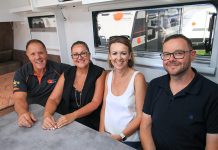Twenty years ago, Concept Caravans was established. The company’s first model: the Ascot. It was a blacktop touring caravan made from meranti timber and ribbed aluminium cladding. It was 2004, so meranti was also used to frame the internal cabinetry – CNC-cut furniture was still seven or eight years away.
Cut to late 2024. Concept celebrated its 20th anniversary, and what better time to launch a significantly revised Ascot that still honours that model’s origins? The 2025 Concept Ascot 640 with Cafe Dinette layout perhaps heralds a new era for Concept Caravans, a manufacturer that has always used meranti timber as its framing material as choice.
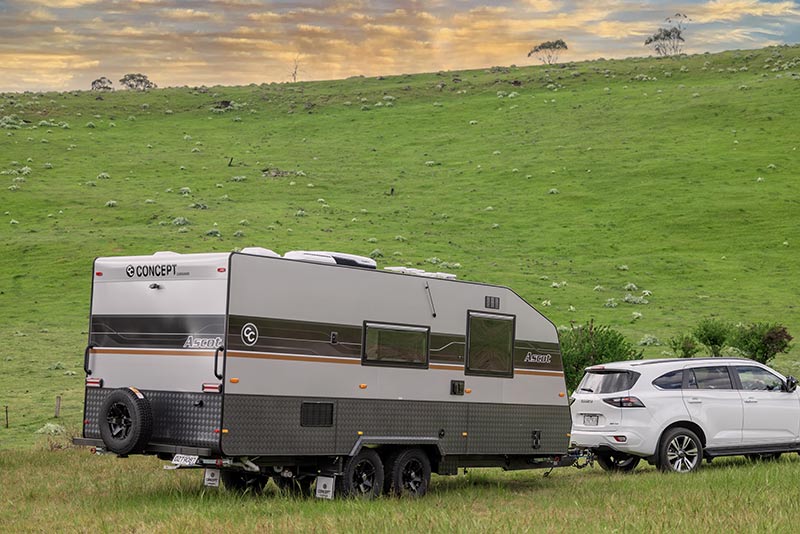 But now, Concept Caravans has adopted 42x19mm lengths of polyurethane to replace the meranti that it has always used, and this 2025 Ascot was the first model in this manufacturer’s significant range to be built with it. I was given an exclusive first-look at a prototype of both the new Ascot and the polyurethane used for its frame.
But now, Concept Caravans has adopted 42x19mm lengths of polyurethane to replace the meranti that it has always used, and this 2025 Ascot was the first model in this manufacturer’s significant range to be built with it. I was given an exclusive first-look at a prototype of both the new Ascot and the polyurethane used for its frame.
STRUCTURALLY SPEAKING
This framing material might be new to our shores but it is used in caravan manufacturing in Europe. It is 40 per cent lighter than meranti, flexible, and can be screwed, stapled and bolted just like meranti. But unlike meranti, it won’t rot. Of course, a meranti-built caravan that’s been properly sealed and had its seals maintained over time should also last a lifetime, but life isn’t always perfect.
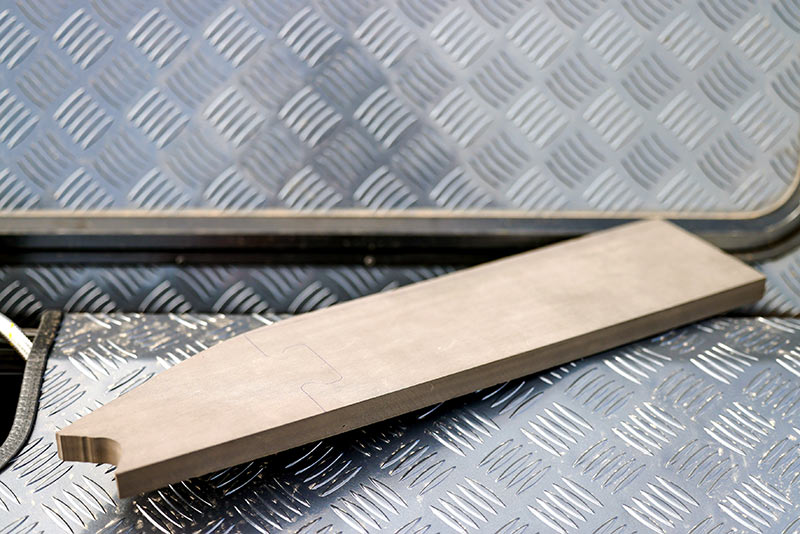
As I explored this caravan, I discovered some spare lengths of polyurethane in the vans tunnel boot. Attempting to break it over my knee, I couldn’t do it. I agree with Concept: it’s a strong material.
The van itself is built atop a painted SupaGal 6in RHS chassis (with optional 2in raiser) by RV Dynamics, Concept’s own chassis manufacturing company. One thing to note about Concept: it builds all structural components in-house. The van’s running gear, of course, is supplied, as are all the appliances, but when it comes to the body of the van, including the chassis, Concept does it all. By controlling each of these aspects, Concept believes it can build better vans – simple as that.
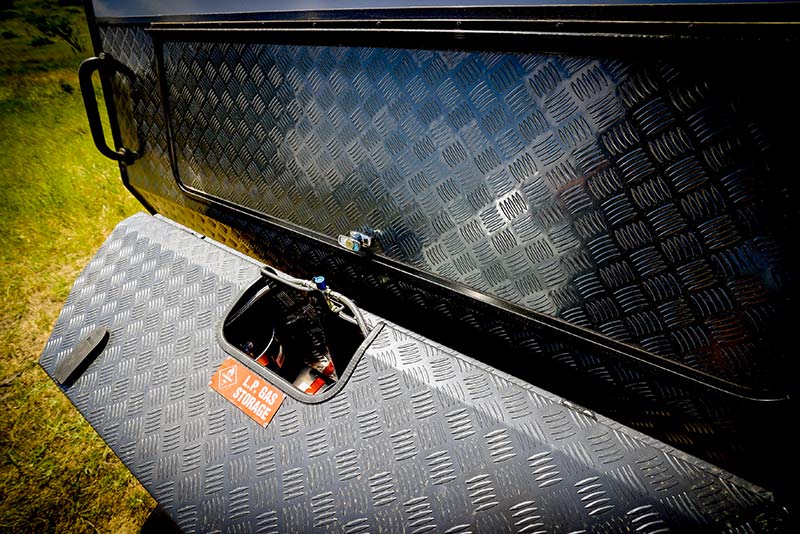 A number of things about this van’s exterior immediately caught my eye. First, I’ll point out the treatment given to the gas cylinders inside a checkerplate box on the A-frame. The regulator protrudes slightly out of the top of the box, but it’s neatly protected by more checkerplate, with all edges finished with pinch weld. I realise this seems like a small thing… but you’d be surprised by how ‘unfinished’ gas cylinders and their regulators can seem on some vans. Here, we have a professional, thoughtful finish.
A number of things about this van’s exterior immediately caught my eye. First, I’ll point out the treatment given to the gas cylinders inside a checkerplate box on the A-frame. The regulator protrudes slightly out of the top of the box, but it’s neatly protected by more checkerplate, with all edges finished with pinch weld. I realise this seems like a small thing… but you’d be surprised by how ‘unfinished’ gas cylinders and their regulators can seem on some vans. Here, we have a professional, thoughtful finish.
The Concept Ascot 640 also comes with an actual front boot! I haven’t seen one of those in a while! Further, the van includes a tunnel boot. External storage options on this van are therefore excellent. There’s yet another storage locker on the nearside, towards he rear.
Now, this van is not an offroader in any sense. It rides on roller-rocker beam axle suspension with a grey water tank and fresh water tank mounted fore and aft of the axle group.
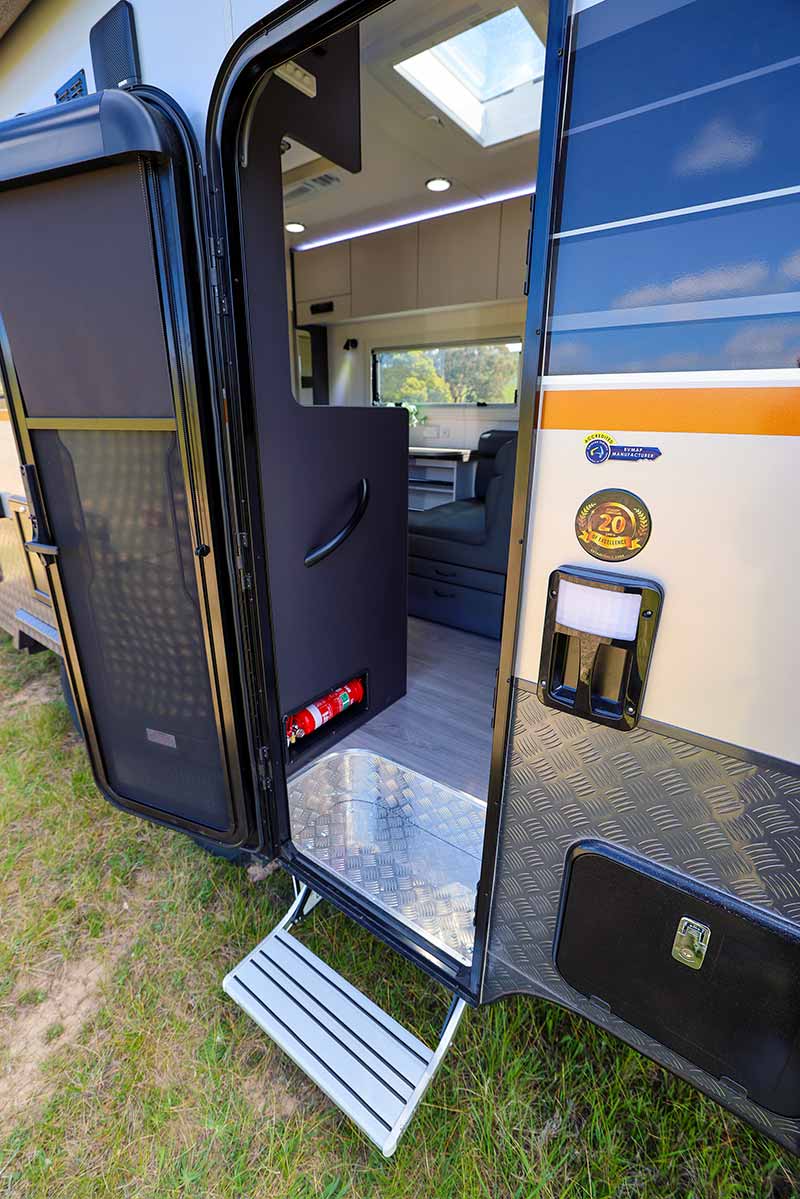 Nearside features of the van include an entertainment locker complete with a TV mounting point and the relevant 12V and antenna connection points. There’s a full-length roll-out awning with just enough clearance between the leading awning arm and front window to allow you to open the window without removing the awning arm first – not always a given on some Australian caravans.
Nearside features of the van include an entertainment locker complete with a TV mounting point and the relevant 12V and antenna connection points. There’s a full-length roll-out awning with just enough clearance between the leading awning arm and front window to allow you to open the window without removing the awning arm first – not always a given on some Australian caravans.
Anti-insect lights, Fusion speakers, a reversing camera and a spare wheel mounted to the rear bumper are all part of the package too.
With its polyurethane frame clad in grey composite aluminium, the Concept Ascot still somehow looks like a traditional caravan. It isn’t over the top in appearance, nor is it underwhelming. There’s something good and honest about its appearance.
CONCEPT ASCOT INTERIOR FINISH
When Concept Caravans made the switch to computer-cut furniture somewhere around 2012, the company invested heavily in its own machinery, from CNC routers to edge-banders. From early on, Concept did it right, and the results speak for themselves. The finish inside this van is as good as, if not better, than what you’d find in a modern house.
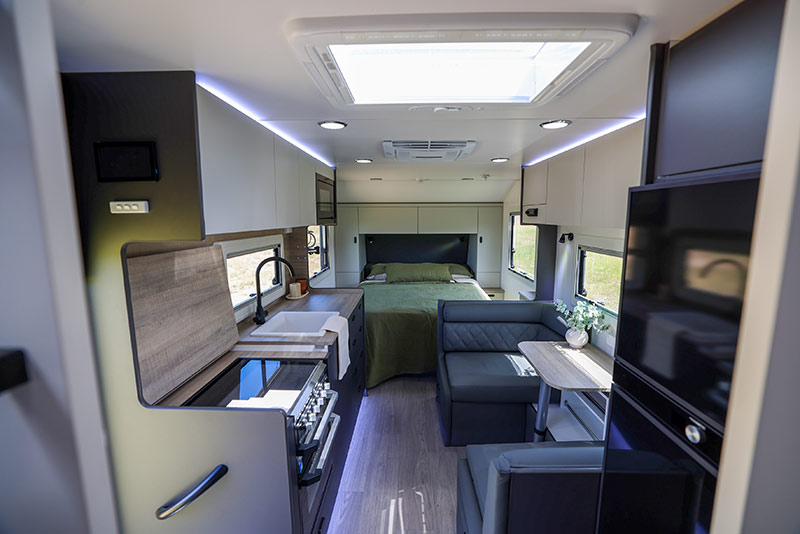 Stepping inside through the keyless Camec door of the Concept Ascot 640 Cafe Dinette, you’ll find a layout that incorporates a queen-size bed with an upgraded pillow-top mattress in the front, surrounded by wardrobes and overhead lockers, with a kitchen filling out the nearside of the van. This kitchen provides a generous amount of bench space, too. And because the cooktop, griller and oven are recessed below bench height, there’s a hinged section of bench above, providing yet more work space when this ‘lid’ is closed. Filtered drinking water is included as well. The white sink seen in the images is an upgrade.
Stepping inside through the keyless Camec door of the Concept Ascot 640 Cafe Dinette, you’ll find a layout that incorporates a queen-size bed with an upgraded pillow-top mattress in the front, surrounded by wardrobes and overhead lockers, with a kitchen filling out the nearside of the van. This kitchen provides a generous amount of bench space, too. And because the cooktop, griller and oven are recessed below bench height, there’s a hinged section of bench above, providing yet more work space when this ‘lid’ is closed. Filtered drinking water is included as well. The white sink seen in the images is an upgrade.
The cafe dinette sits opposite. With lounges upholstered in genuine leather – not the faux leather you’ll find on many vans – and Concept has also given the lounges special slide-out ‘trays’. Simply add the supplied leather-upholstered infills, and you have some footrests. Top marks to Concept, too, for actually including a 240V and proper USB point at the dinette. Often, you’ll find USBs integrated into the reading lights, which I find awkward, so to have wall-mounted USBs here is a win.
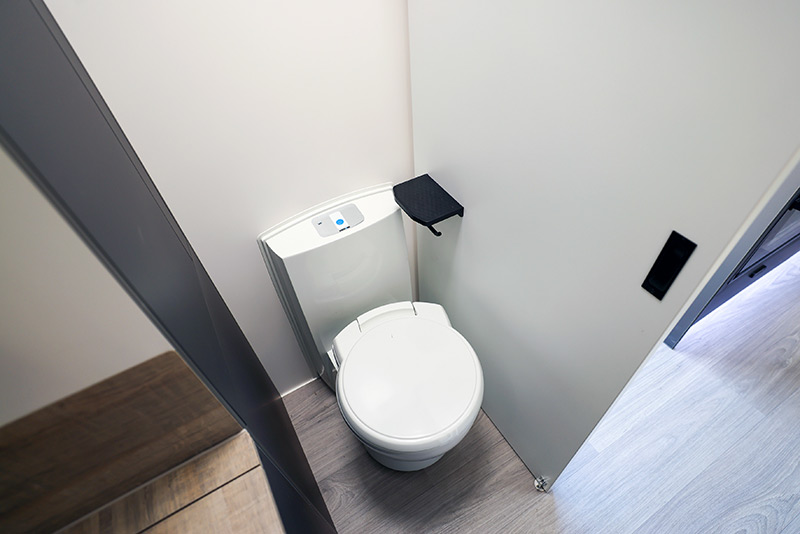
A quick word about the rear bathroom. At first, I was a little surprised to find the cassette toilet on the nearside and the shower on the offside. Often, these features are reversed, with the toilet on the offside so that when you remove the toilet cassette, it’s a little more discreet. On asking Concept why the shower and toilet were configured that way, I was told that it was due to customer feedback.
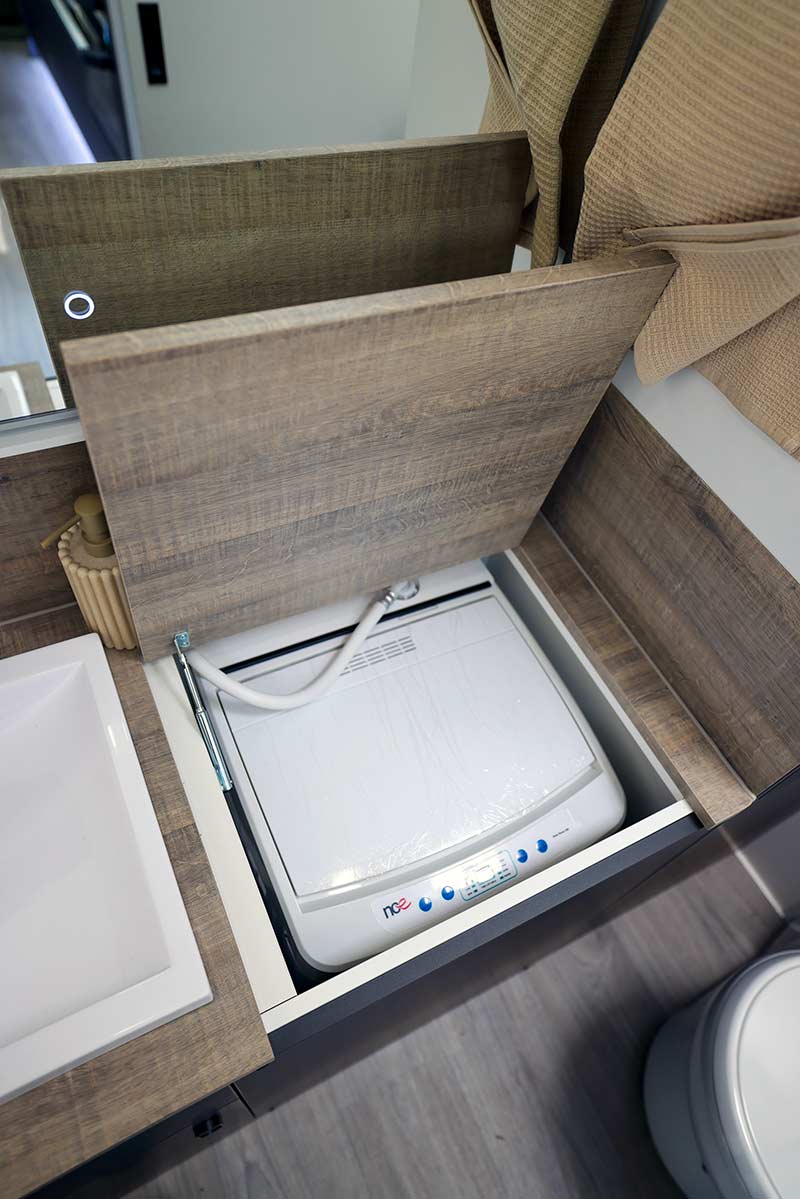 Apparently, when customers enter the van, they’d prefer to see a shower rather than a toilet. Fair enough. It isn’t my preference, but I can’t fault Concept for giving its customers what they want.
Apparently, when customers enter the van, they’d prefer to see a shower rather than a toilet. Fair enough. It isn’t my preference, but I can’t fault Concept for giving its customers what they want.
The bathroom also includes, of course, an attractive vanity unit hiding a top-loader washing machine beneath the bench. Like the rest of the van, it’s an attractive space.
The Ascot gets a 100Ah lithium battery, a DC-DC charger, a Projecta power management system that includes a 7in digital display showing crucial battery data, and XXXW of solar on the roof. Other features include soft-close drawers throughout, a Fusion sound system with Fusion speakers inside, a three-way Dometic fridge, dimmable touch lighting, and a microwave.
GORV’S VERDICT
Very slowly, the caravan industry seems to be exploring new materials to frame caravans, with a slight trend away from timber. By employing the German-made polyurethane wall studs, Concept has demonstrated its commitment to moving with the times.
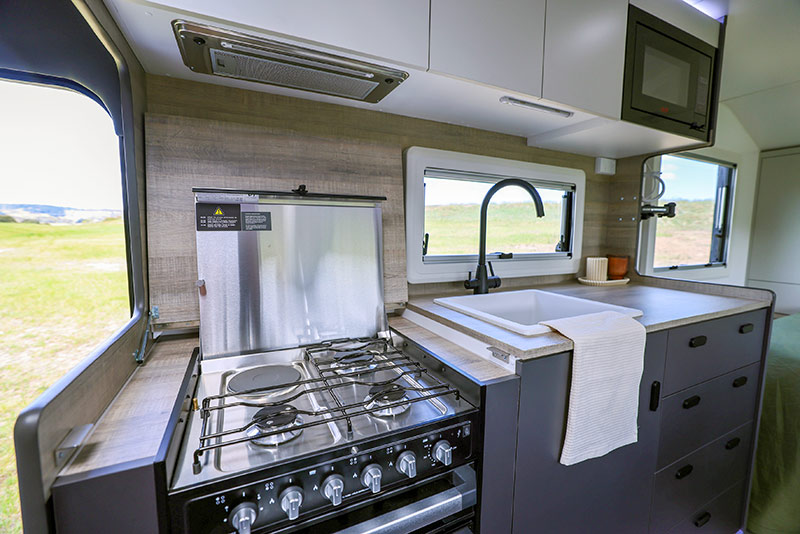 Notwithstanding that, the Concept Ascot 640 – which is available in four layouts – still looks like a Concept. Nothing has changed there. And if you know your caravans, you’d agree that is a very good thing.
Notwithstanding that, the Concept Ascot 640 – which is available in four layouts – still looks like a Concept. Nothing has changed there. And if you know your caravans, you’d agree that is a very good thing.
THE SCORE
FIT AND FINISH – 
LAYOUT – 
INNOVATION – 
HITS & MISSES
COMPLETE SPECS
Overall length: 8.9m
External body length: 6.28m
External width: 2.4m
Travel height: 3.04m
Internal height: 2.03m
Tare: 2551kg
GTM: 3104kg
ATM: 3251kg
Unladen ball weight: 147kg
Group axle capacity: 3200kg
Frame: 42x19mm polyurethane
Cladding: Composite aluminium with black checkerplate
Coupling: DO35
Chassis: RV Dynamics 6in painted SupaGal
Suspension: Beam-axle roller-rocker
Brakes: 10in electric
Wheels: 15in alloy
Fresh water: 2x95L
Grey water: Yes
Shower: No
Awning: Manual wind-out
Battery: 200Ah lithium with DC-DC charger and Projecta power management system
Solar: 400W
Air-conditioner: Dometic Freshjet reverse-cycle
Gas: 2x9kg
Bike rack: No
Sway control: No
Cooking: Four-burner cooktop with griller and oven
Refrigeration: Dometic AES 188L
Microwave: Yes
Shower: Fully-moulded fibreglass with Aquapanel in roof
Heating: No – reverse-cycle air-conditioner only
Toilet: Cassette
Washing machine: Top-loader
Lighting: LED
Entertainment: 24in flatscreen TV; Fusion sound system with internal and external speakers
White sink upgrade; 2in chassis raiser; DO35 coupling
$91,990
Base price: $89,990




